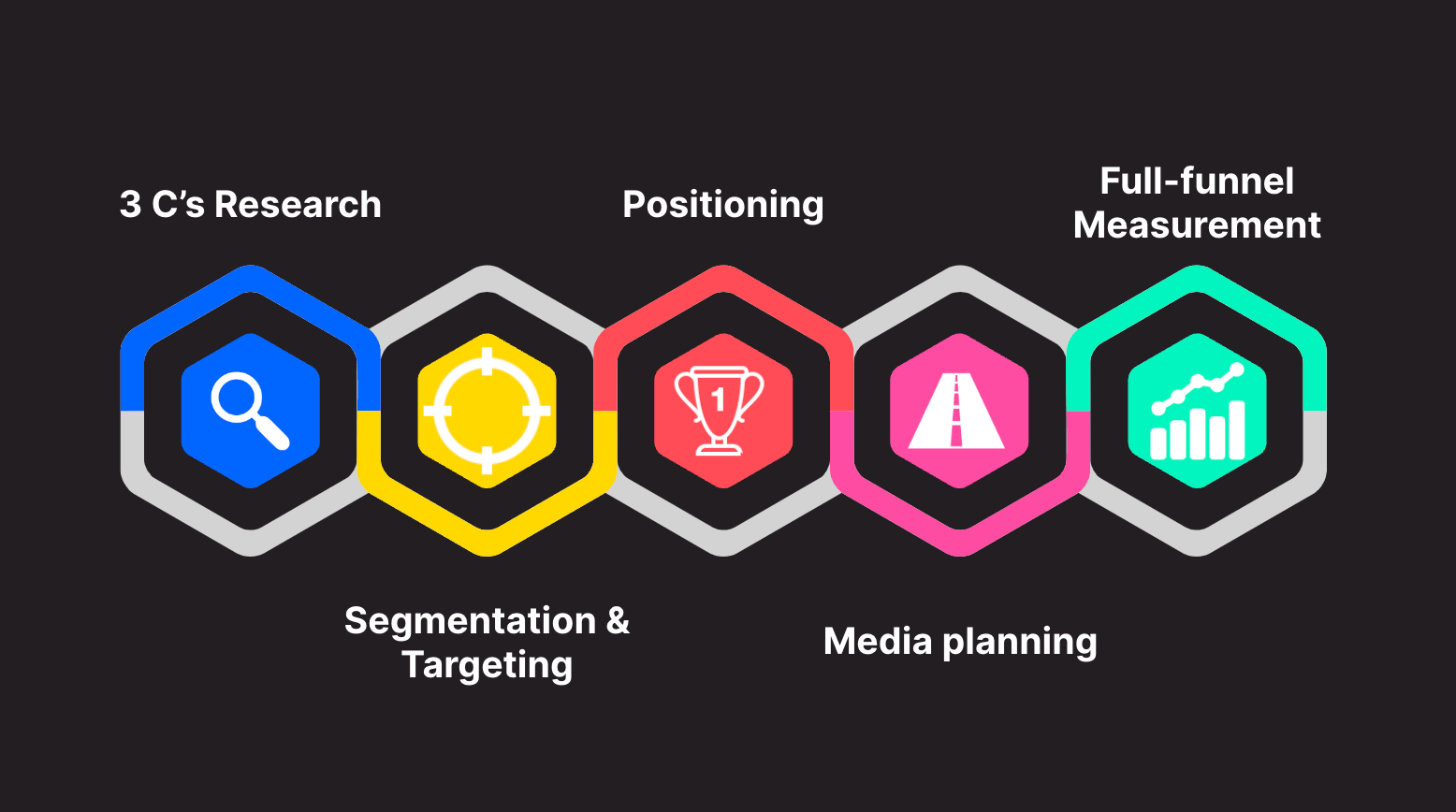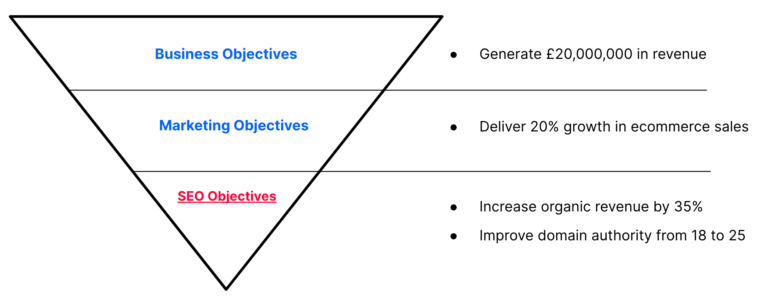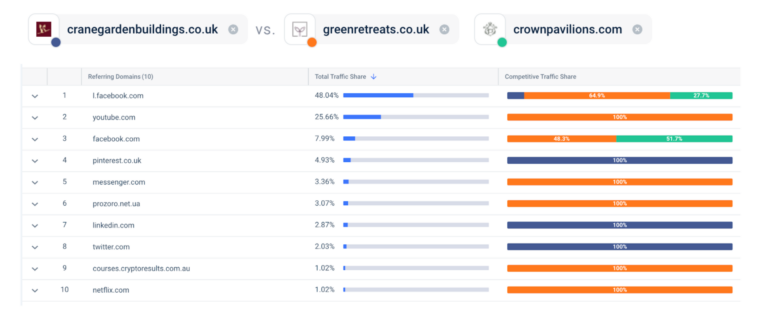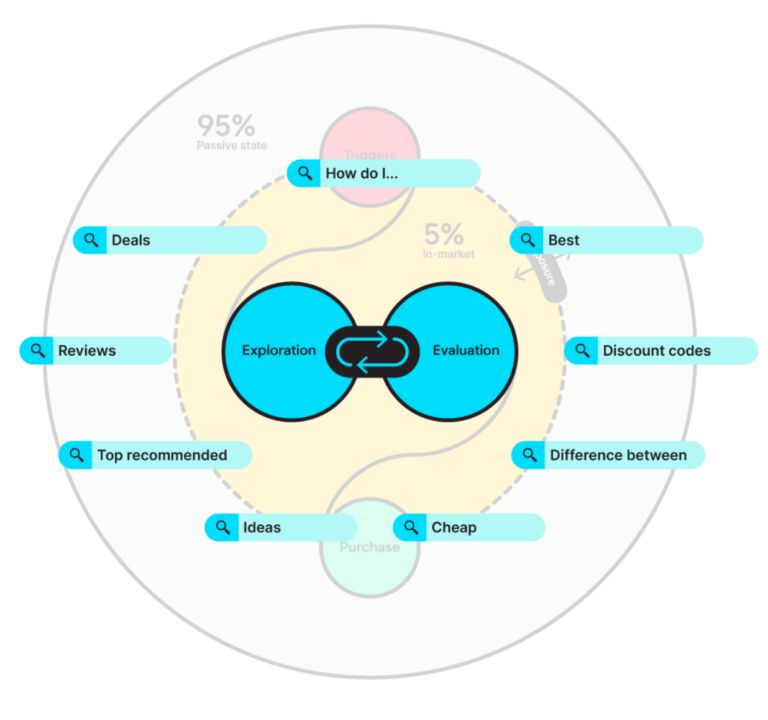It’s not uncommon for SEO professionals to find themselves thrust into a role with little to no training in traditional marketing theory.
However, as the organic landscape becomes increasingly complex and fragmented, the need to understand and integrate timeless marketing principles into your SEO strategy has never been more critical.
Search Engine Optimization > Organic Optimization
Relying on search engines alone is no longer enough to maximize your organic exposure to potential customers.
Today, users discover information on the internet from a variety of sources.
With the advent of AI-driven search and expanding paid search placements, we’re navigating a terrain where organic real estate in search results is shrinking, and search engines are just one part of an incredibly complex buyer journey.
Platforms such as TikTok (used by 40%+ Gen Z users as a search engine), Pinterest, and Reddit all present opportunities for additional organic reach outside of Google search – which means your strategy needs to evolve from search engine optimization to multi-platform organic optimization.
This shift requires a holistic understanding of marketing that transcends algorithms and dives deep into consumer behavior, strategic planning, and long-term brand building.
In this post, I’ll cover five essential marketing concepts that not only complement but can redefine and elevate your search performance.

In the following sections, I’ll explore each principle in detail, shedding light on how they can be applied and the tangible benefits they offer, all rooted in proven marketing science.
1. 3Cs Research
3Cs research is a foundational aspect of marketing that can be leveraged to enhance your organic strategy.
It means building a deeper understanding of your company, your customers, and the overall category or industry.
Let’s delve into each of these areas and explore their relevance for SEO.
Company Research
What It Is
Company research is about understanding your business (or your clients’ business) inside out. It should dig deeper into your internal understanding of:
- Objectives – What you’re trying to achieve as a business, and how marketing can support.
- Audience – Who you’re targeting and why.
- Positioning – What makes your business stand out in the eyes of potential customers?
- The market – What are the major challenges faced, and what opportunities do you see in the future?
Why It Matters To SEO Practitioners
Armed with a deeper understanding of the market and the trends shaping the future of the market, you’ll be able to focus your efforts on producing content that will better resonate with potential buyers.
Additionally, understanding the company’s positioning and key objectives will help you tie back your performance to higher-level goals and better prove value to senior stakeholders.
Examples And Benefits
Undertaking high-level business objectives will help you ladder up your organic reporting to showcase results to the C-suite.
Showing how your organic KPIs can help deliver broader marketing and business objectives will help showcase the value of organic to any business.
 Image by author, August 2023
Image by author, August 2023Customer Research
What It Is
This involves identifying your target audience’s characteristics, needs, and behaviors through both qualitative (e.g., depth interviews) and quantitative (e.g., surveys) research.
Why It Matters To SEO Practitioners
Having a better understanding of who you’re targeting allows you to create content that resonates with that audience, improving overall organic reach for relevant topics, and boosting engagement and conversion rates.
Examples And Benefits
By understanding your audience’s needs and pain points, you can craft more relevant content, drive more clicks to your website, and build your brand presence alongside the most timely themes.
Category Research
What It Is
Category research is understanding the broader market, competitors, trends, and potential opportunities or threats within the industry.
Why It Matters To SEO Practitioners
Understanding the industry landscape allows you to identify gaps and opportunities competitors may have overlooked.
Examples And Benefits
At a basic level, analyzing competitors’ backlink profiles can uncover opportunities for new backlinks, strengthening your site’s authority.
You can also utilize tools such as SimilarWeb to assess the networks and channels that your competitors are investing in that are delivering the best results organically:
-
 Screenshot from SimilarWeb, August 2023
Screenshot from SimilarWeb, August 2023
By delving deeper into 3Cs research, you’ll gain deeper insights that aligns SEO with the broader business strategy, delivering more value to the brands you work with.
2. Segmentation And Targeting
Segmentation involves breaking down the total market (e.g., every golfer on the planet) into smaller, more manageable segments (e.g., golfers over 50 years of age).
Targeting focuses on selecting the most lucrative segments to pursue based on market fit, size, and growth potential.
By understanding which customer segments are most important to your business, you can create highly targeted organic strategies and focus your efforts on the right audiences.
Segmentation
What It Is
Segmentation involves dividing the broad market into smaller, distinct groups based on characteristics like demographics, psychographics, behavior, or geography.
Targeting involves choosing which segments to focus on based on their potential value and alignment with your business.
 Image by author, August 2023
Image by author, August 2023Why It Matters To SEO Practitioners
Dividing your audience into segments allows you to tailor your SEO strategies to meet each group’s specific needs and preferences.
This leads to more relevant content and better engagement with the content you create.
Focusing on the most lucrative or relevant segments ensures that your SEO efforts are directed where they will have the most impact.
Examples And Benefits
- Demographic segmentation: If you’re targeting a certain demographic, such as smaller fleets (using the haulage example above), you’ll be able to create content based on the needs of these audiences, which will be vastly different from larger haulers.
- Geographic segmentation: If your business serves multiple locations, creating location-specific landing pages for key regions can improve local search rankings and drive more targeted traffic.
This principle will allow you to move beyond a one-size-fits-all approach to a more nuanced, personalized strategy that aligns with the unique needs and wants of different customer segments.
3. Positioning
Brand positioning is about creating a unique, positive image of your brand in the customer’s mind.
It is the theme that should act as the golden thread across all marketing activity.
What It Is
Positioning is the perception that you intend your customers to have about your products or services.
Successful positioning involves defining what sets you apart from the competition and why they should choose your brand over the competition, which should result in clearer messaging that shows up in campaigns and creative assets.
 Image by author, August 2023
Image by author, August 2023Why It Matters To SEO Practitioners
Effective positioning enhances brand recall, trust, and credibility.
How you position your brand can profoundly impact your organic performance, bring in more branded traffic through search, and lead to higher conversion rates for existing website traffic.
Examples And Benefits
By understanding the unique selling points and themes that set your brand apart from the competition, you can focus in on increasing content in line with these themes to ensure you maximize organic visibility to underpin your brand’s unique positioning.
For example, Red Bull’s brand positioning revolves around “giving you wings.”
This transcends every marketing activity it invests in as a brand.
It wants to be synonymous with excitement and risk-taking, and it has succeeded at this attempt through various campaigns.
From an organic standpoint, understanding this positioning can inform content, PR and co-branding opportunities and ensure that any content suggestions you put forward are aligned with your company’s brand positioning.
4. Media Planning
Developments such as Google’s Search Generative Experience, the rise of social platforms as search engines, and the growing influence of creators on organic performance all highlight the complexity of the current organic landscape.
Effective media planning means selecting the right channels but also understanding when and how to use them.
Whether it’s social media, paid, or organic search, achieving maximum brand exposure wherever your customers are online is critical to growth in such a complex ecosystem.
 Image by author, August 2023
Image by author, August 2023Media planning is traditionally associated with advertising. However, in the context of SEO and organic search, it’s equally important.
What It Is
Media planning for organic search includes identifying and leveraging various online channels, like search engines, social media, review platforms, third-party sites, and more, to distribute and promote content to potential customers wherever they are online.
Why It Matters To SEO Practitioners
Effective media planning ensures that your content reaches the right audience at the right time. It’s not about creating high-quality content but about ensuring that content is seen and engaged with.
Examples And Benefits
- Channel selection: Identifying where your target audience spends time online helps in selecting the right channels. If your target audience is professionals, platforms like LinkedIn might be a more effective use of your time than others.
- Content format planning: Different platforms may require different content formats. A well-planned media strategy could include creating short video snippets for Instagram, long-form articles for your blog, and engaging videos for YouTube, all from one core content piece.
- Cross-channel integration: A cohesive media plan ensures that your messages are consistent across channels. Using consistent language and visuals enhances brand recognition and drives better results.
- Monitoring and optimization: Good media planning also includes tracking the performance of various channels and being ready to adjust your strategy.
Approach organic with a media planning mindset, and you’ll expand your view beyond traditional search engine optimization, generating much greater organic reach.
5. Full-funnel Measurement
Full-funnel measurement goes beyond traditional SEO metrics like rankings and traffic.
It looks at the entire customer journey, from awareness to conversion, to understand how users are interacting with your content and how it leads to sales.
Why It Matters To SEO Practitioners
While traditional SEO often focuses on driving traffic and improving rankings, you must ensure that these efforts contribute to overall business goals.
Examples And Benefits
 Image by author, August 2023
Image by author, August 2023- Awareness: Monitoring how many new visitors are attracted through specific keywords or content helps you understand what’s generating initial interest.
- Consideration: Analyzing on-site behavior, such as click-through rates on product pages, content downloads, and number of pages viewed on average, will identify where improvements can be made to the user journey.
- Conversion: Identifying which channels and pages lead to actual sales or sign-ups.
Successful organic optimization requires a holistic approach that transcends the full buyer journey.
By setting the right key performance indicators (KPIs) and measuring performance, you can see how your efforts contribute to every stage of the customer journey, allowing for more targeted, responsive, and impactful strategies.
Conclusion
The five principles mentioned above are essential building blocks to future-proof your SEO organic strategy.
They are an essential bridge between the timeless principles of traditional marketing and the dynamic world of digital marketing, offering a framework to help you ensure your brand is set up for success regardless of the latest technological trends that impact search.
More resources:
- How To Build A Future-Proofed SEO Strategy When AI Is Changing SEO
- Why It’s Time To Reinvent And Future-Proof Your Approach To Content Marketing
- State of SEO 2024: Disruptions, AI & Content Strategies
Featured Image: fizkes/Shutterstock





![AI Overviews: We Reverse-Engineered Them So You Don't Have To [+ What You Need To Do Next]](https://www.searchenginejournal.com/wp-content/uploads/2025/04/sidebar1x-455.png)